On the morning of 7 July, the 2024 China Macro Forum was held in the lecture hall on the ground floor of the Administration Building of Shanghai University of Finance and Economics. Focusing on the theme of ‘New Quality Productivity Leads High Quality Development of Economy’, the forum released the Report on Analysis and Forecast of China's Macroeconomic Situation in 2024, analysing and judging the current economic development situation and the risks and challenges encountered, as well as giving special reports on deflation, foreign trade, monetary policy, real estate market, local government debt and other topics. It also made special reports on deflation, foreign trade, monetary policy, real estate market, local government debt, etc.
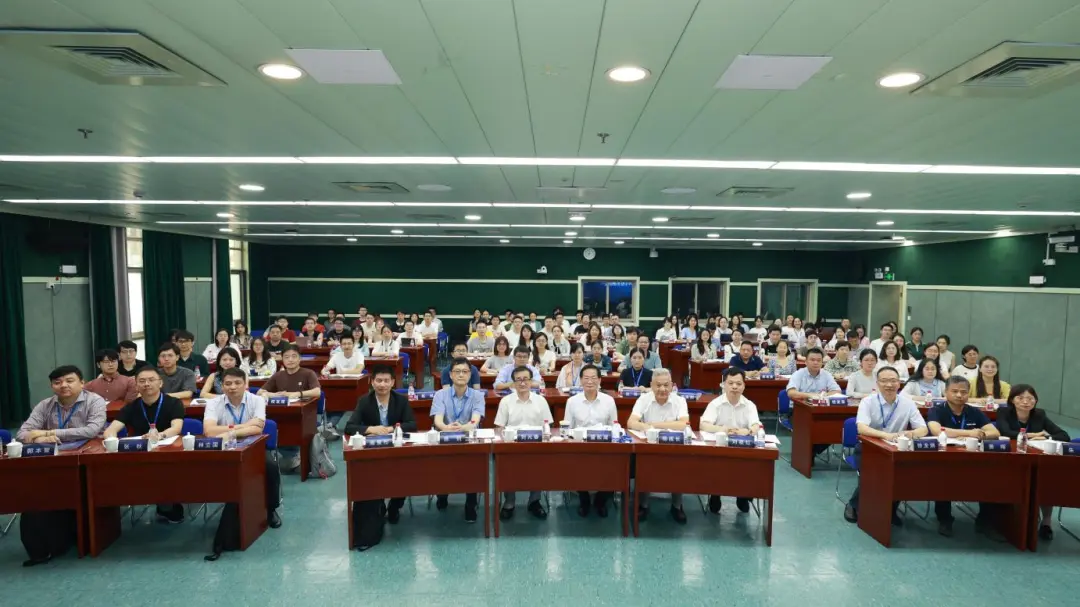
Sheng Songcheng, Professor of Shanghai University of Finance and Economics and CEIBS, Yang Changcheng, member of the National Committee of the Chinese People's Political Consultative Conference (CPPCC) and Chief Economist of Shenwan Hongyuan Securities Research Institute (SHSRI), Chen Zhao, Executive Deputy Director of the Research Centre for Chinese Socialist Market Economy of Fudan University, Liu Quanhong, Director of the Institute of Industrial Economy and Technological Economy of the National Development and Reform Commission (NDRC), and Zhou Jingtong, Deputy Director of the Research Institute of the Bank of China (BOC), were among the guests who attended and delivered keynote speeches. Liu Yuanchun, President of Shanghai University of Finance and Economics, attended the conference and delivered a speech.
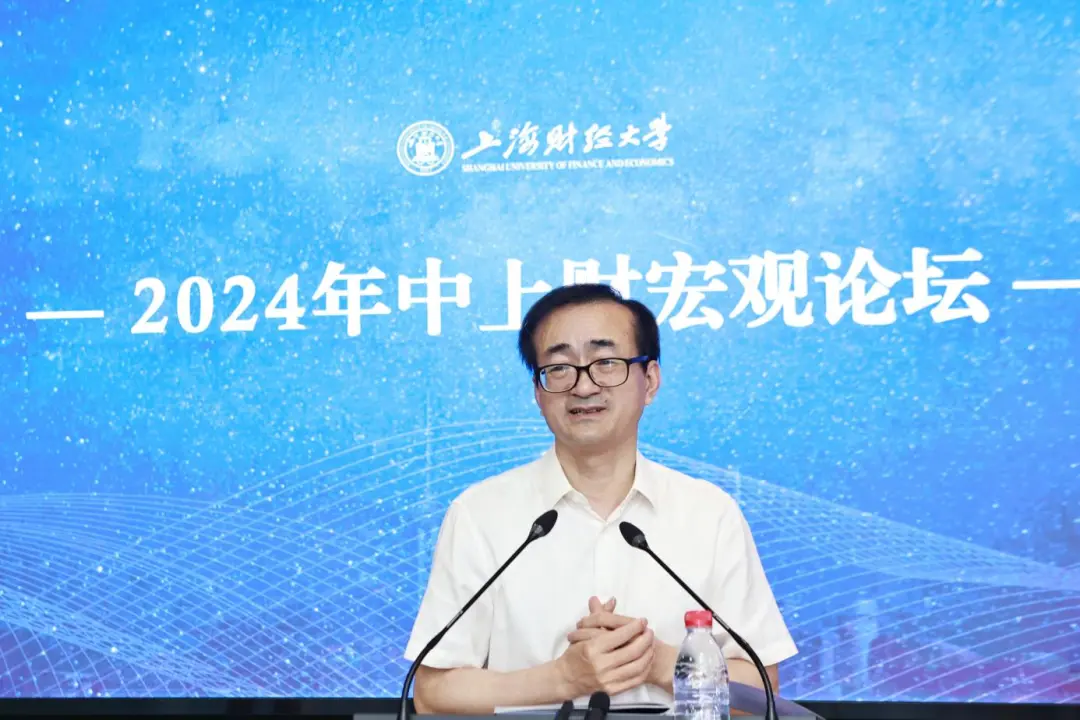
Liu Yuanchun said that the study of China's macro-economy must comprehensively examine the impact of the big era on China's macro-environment and internal logic, and it may be difficult to find answers to the problem simply by talking about finance, industry, and money and finance. The three major forces dominating China's new macroeconomic development, new logic and new laws are the variability of the external environment brought about by the unprecedented change, the deep adjustment of real estate, and the development of China's new productive forces driven by the fourth wave of industrial revolution. Firstly, the geopolitical variation has made geopolitics gradually become the dominant force of world risks, and the geopolitical reconstruction force has begun to surpass the capital force, fundamentally changing the logic of traditional global economic resource allocation, and the decline of the pivot of global economic growth, the structural differentiation, and the change in the nature of risks have directly changed the capital asset pricing model and the law of financial resource allocation; secondly, the deep adjustment of real estate Completely announced the end of the traditional way of development, China's economic structure is also followed by fission, China's pillar industries are experiencing a comprehensive transformation, the process of transformation. The predicament in the real estate sector is that the logic of industry, the logic of GDP growth, the logic of money, and the logic of finance have all undergone drastic changes. Third, the new quality productivity has become the new narrative of the times in the wave of the fourth industrial revolution. Over the past 20 years, China has made brilliant achievements in its innovation-driven strategy and come out with a new path of new quality productivity, most notably by making new breakthroughs in the digital economy, a strategic emerging industry.
The ‘new three’ exports exceeded the trillion-dollar mark for the first time last year, and the year-on-year growth rate of investment in high-tech industries was maintained at double-digit, which became the cornerstone of investment stability. These breakthroughs and achievements herald a new round of technological progress in industrial expansion to achieve innovation. Therefore, China's new round of overcapacity is fundamentally different from the traditional overcapacity, and this difference marks that China has found a new way in the new quality of productivity and a new round of industrial revolution. At the same time, China's government, in leading the new round of industrial and technological revolutions, has comprehensively updated its traditional industrial policies, showing new connotations and forming a multi-dimensional and complementary coupling mode between the government and the market. He emphasised that changes in new industries and technologies will definitely change the traditional real economy and even the law of financial system operation. The changes in the total volume, structure, and dynamic laws brought by the three forces determine that it is difficult to understand the essence of China's economy with the traditional perspective, and to find solutions to the current challenges facing China's macroeconomy in local studies. Therefore, the study of China's macroeconomics should have the vision of the times, and examine the new logic, new mechanism and new law presented by China's economy with higher wisdom. He hoped that the participating experts and scholars can directly face and answer the hot issues that the market and the public are concerned about, which also coincides with the original intention of the Macro Forum to provide the government with the thinking of the academia, to form a neutral platform for discussion, and to help teachers and students to find an effective path to think and learn outside the classroom and books.
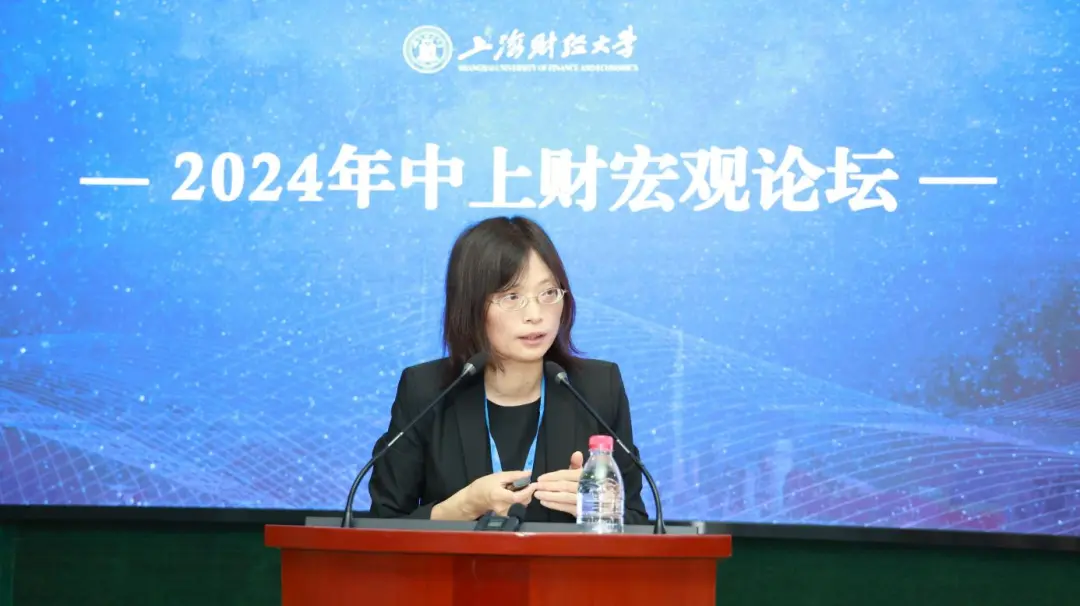
Zhu Mei, a member of the macro team of Shanghai University of Finance and Economics and a professor at the School of Economics, released the Report on Analysing and Forecasting China's Macroeconomic Situation in Mid-2024 on behalf of the team. She said that in 2024, external risks remain at a high level, with increased trade risks in a big country game environment and geopolitical shocks to the trade structure. Domestic is also facing multiple challenging factors, deflationary pressure remains, the demand side of the real estate market remains sluggish, and local government debt risk differentiation intensifies. Although there are many risk factors and difficult challenges, China's economy has generally recovered since this year, and the economic indicators from January to May are basically in line with expectations, so the target of annual growth of about 5 per cent is basically achievable.
At present, high-quality development has become the main theme of economic and social development, and correctly analysing and viewing the current economic recovery trend and weak points plays a key role in addressing various risks and challenges and pushing the economy forward. On the supply side, the service industry has resumed growth in all aspects, the industry is rising steadily, and the construction industry is running steadily, but the real estate industry continues to decline, and it is now in the structural transformation pain period, the international crude oil price is also subject to minor fluctuations, the food price continues to fall, and the pressure on the global supply chain is temporarily low. Demand side, consumption moderate recovery, but the growth is less than expected; fixed asset investment growth rate of internal differentiation, manufacturing investment to enhance the role of investment, infrastructure investment steady growth, real estate investment continues the downward trend, high-tech industry investment growth accelerated; foreign trade growth steadily, the external risk is still at a high level. In terms of macroeconomic policy, the monetary policy generally maintains a steady state of sustainable and anti-short-circuit; the fiscal policy continues to be powerful, but the local fiscal revenue and expenditure are under pressure at both ends. The macro team at Shanghai Caijing suggests that in the critical period when macroeconomic development is moving towards a new equilibrium, we should focus on playing a good combination of macroeconomic policies, and push China's economy to continue to consolidate and strengthen the upward trend.
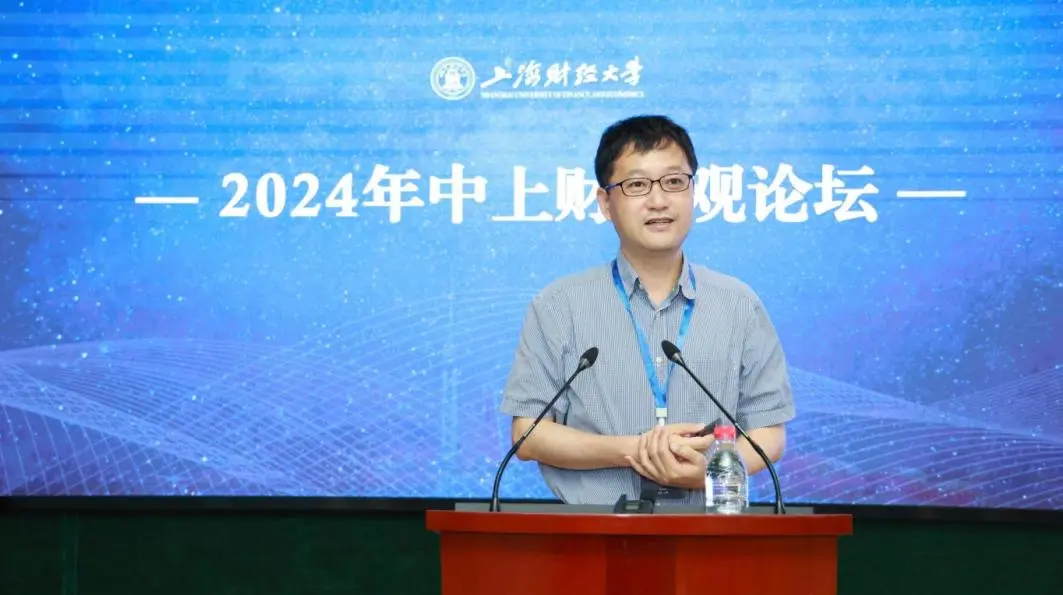
After the release of the report, we entered the keynote speech session. Chen Zhao delivered a keynote speech on the theme of ‘Emerging Industries and the Rise and Fall of Cities’. He talked about the rise and fall of cities, which is related to the growth and decline of population in different regions and involves macro-development and structural adjustment. Urban contraction is a common and persistent challenge globally, with some cities contracting over the past decades and others achieving a return to growth after contraction. He firstly elaborated on the internal logic of emerging industries and urban development: the development of emerging industries has high growth and suddenness, which stimulates the economy by pulling the growth of upstream and downstream traditional industries, and then leads to the development of the labour market in shrinking cities, which plays an important role in the contraction and expansion of cities. Reviewing and combing the policies related to emerging industries, China's government attaches great importance to the development of emerging industries, and has formulated and implemented a series of policies to promote the development of emerging industries since 2009, escorting the development of strategic emerging industries. The sustained and rapid development of strategic emerging industries has injected a strong impetus for economic development, and the proportion of the added value of strategic emerging industries in China's GDP has risen from 4% in 2010 to 11.7% in 2020. Strategic emerging industries also provide new development opportunities for shrinking cities.
With regard to the development of emerging industries to promote the development of the labour market in shrinking cities, he said that for every 1 per cent increase in the development of emerging industries, the resident population of cities increased by 0.02 per cent, the employment rate grew by 0.03 per cent, and wages increased by 0.03 per cent. Accordingly, he further explains the intrinsic mechanism of emerging industries and urban development: emerging industries stimulate the economy by pulling the growth of upstream and downstream traditional industries, which in turn leads to the development of the labour market in contracting cities; and through the industrial agglomeration effect and attraction of traditional industries, it leads to the inflow of population, increase in employment, and growth in wages. Finally, he suggested that the process of urban contraction is not irreversible, and that after a period of population outflow, it is possible for cities to achieve urban scale reversal again through the development of appropriate new industries. It is hoped that the government will cultivate a good market environment and business environment through indirect policy support, so that the market can spontaneously grow future industries and emerging industries.
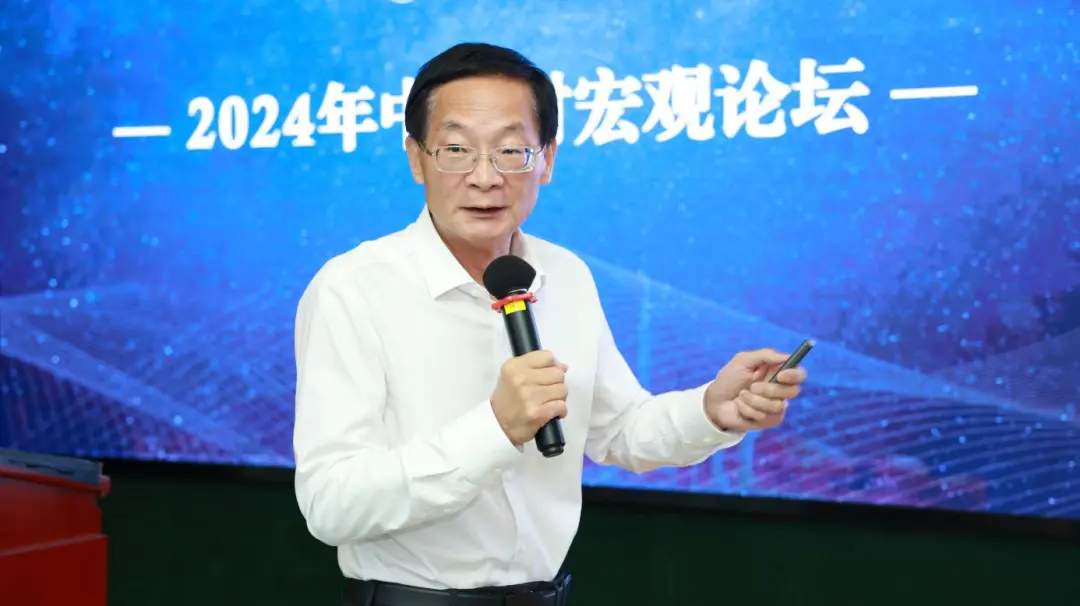
Sheng Songcheng delivered a keynote speech entitled ‘Financial data is also a reflection of economic performance’. In his view, financial data is a direct reflection of economic performance. The current economic situation requires close coordination between monetary and fiscal policies to promote stable economic growth and structural optimisation. He first discussed the relationship between financial data and economic operation, pointing out that the lack of effective demand is the main reason for the current weakness of financial data. The lack of demand is manifested in the fall in our order index, the rise in the finished goods inventory index, and the decline in the capacity utilisation rate. Looking at the financial data, the narrow money M1 balance at the end of May fell by 4.2 per cent year-on-year, which is mainly due to three reasons. First, the decline in corporate demand deposits led to the decline in M1, reflecting the current weak willingness of enterprises to invest, as enterprises tend to deposit funds into demand deposit accounts that can write cheques if they invest in the short term. Second, the downturn in property sales has reduced the income of real estate enterprises, resulting in a decline in the M1 balance. Funds from real estate enterprises' sales are generally placed in demand deposit accounts. Third, weak consumer demand inhibited the conversion of residential deposits into corporate deposits. It can be seen that weak financial data is a manifestation of slow economic repair.
He then discussed the impact of financial data on structural changes in the economy and the need for monetary policy to be complemented by proactive fiscal policy. He pointed out that China's economy was generally improving, but the recovery process was slow and the foundation still needed to be consolidated. In the past, real estate loans accounted for a high proportion of overall loans, and the proportion has gradually declined recently; the balance of medium- and long-term loans in the service sector, the balance of medium- and long-term loans in the industrial sector, and the balance of loans to science- and technology-based small and medium-sized enterprises (SMEs) other than real estate have all increased at a rate faster than the overall growth rate of all loans year-on-year, indicating that more resources have flowed to the advanced manufacturing industry and the modern service industry. The overall investment in fixed assets declined, but investment in high-tech industries continued to grow at a faster pace, reflecting the fact that China's economy is undergoing transformation and upgrading. Data on the scale of social financing also reflected changes in the economic structure, such as the recovery of off-balance-sheet financing, which mainly reflects liquidity among enterprises, suggesting a gradual improvement in corporate financing; and the speed of government bond issuance accelerated in May, with a more active fiscal policy. In order to support economic growth and structural adjustment, he suggested that monetary policy should be complemented by proactive fiscal policy, which should be further brought into play in stabilising growth and adjusting structure, and that the pace of government bond issuance should be appropriately increased.
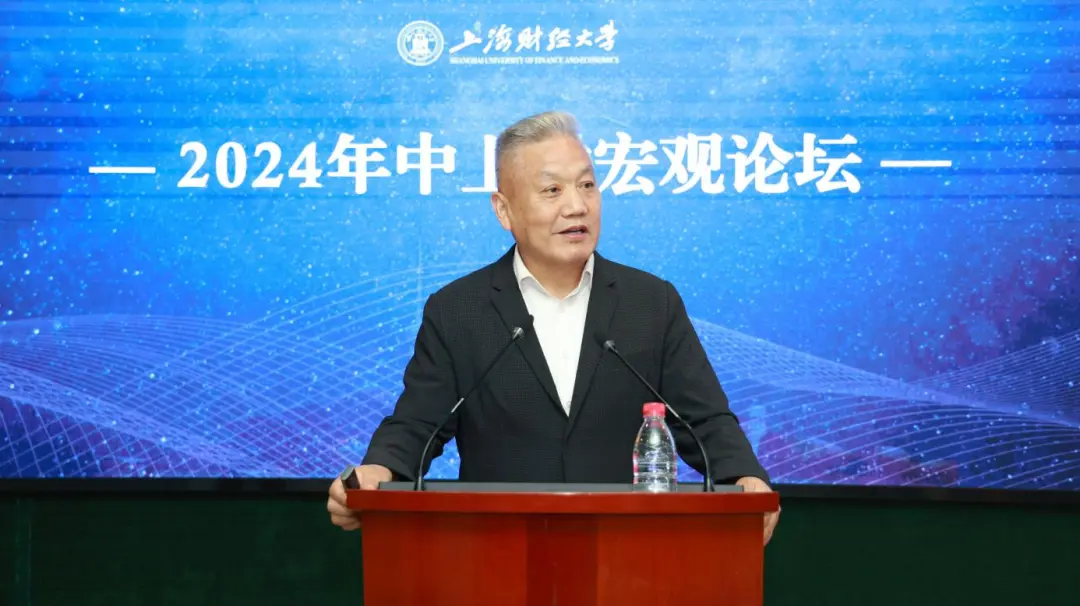
Yang Changcheng delivered a keynote speech on the theme of ‘New Concepts of Finance and Treasury for Innovative New Quality Productivity’. Combined with the great significance of the new quality productivity, he proposed that the financial system and financial management need to adapt to the development of the new quality productivity and self-innovation. Firstly, he reviewed the major industrial changes brought by the new quality productivity. At the enterprise level, the new quality productivity has changed the enterprise development power, development factors, production process and production results. At the industrial level, the new quality productivity leads to changes in the horizontal relationship, vertical relationship, driving factors, and correlation relationship of the industry.
Then, he highly summarized the new requirements of new productivity for financial services to the real economy: science and technology innovation finance requires finance to better serve the innovative financing needs of enterprises, full-cycle finance requires the financial system to provide comprehensive financing services that integrate multiple financing tools and coordinate long-term and short-term funds, risk finance requires the financial system to serve the risk management needs of new productivity enterprises throughout the entire process, industrial chain finance promotes the transformation of traditional supply chain finance model to industrial chain finance model, movable property finance promotes the transformation of real estate finance model to movable property finance model, M&A financial services meet the strong M&A and restructuring needs of enterprises under the guidance of new productivity, governance finance drives the optimization of corporate governance structure through the optimization of corporate financial structure, and green finance services meet the needs of green transformation of new productivity enterprises. Based on this, he proposed that new productivity requires innovative financial management. The development of new productivity has led to an increasing abundance of capitalization factors, and economic development requires financial management to comprehensively improve the capabilities of strategic management, budget management, process management, and risk management. By optimizing financial methods, we can create distinctive comparative advantages for enterprises, better reflect enterprise institutional costs and transaction costs, promote the integration of real, equity and financial investments, resolve the differences between financial and real investments, more comprehensively reflect the diversified values of enterprises, promote the integration of corporate financial governance, risk governance and structural governance, and guide the transformation of corporate finance to industrial chain finance.
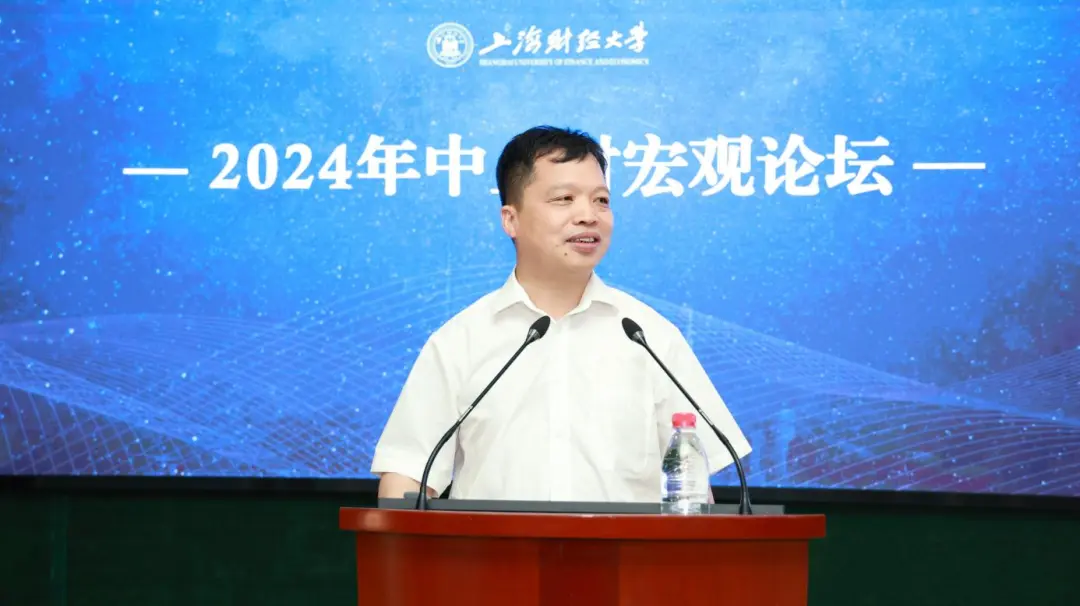
Liu Quanhong delivered a keynote speech entitled "Accelerating the development of new quality productivity and promoting the high-quality development of traditional industries". Taking the combination of new quality productivity and traditional industries as the starting point, he discussed how to play an important role in the development of new quality productivity. He said that we must correctly understand the status and contribution of traditional industries in my country's modern industrial system. As an industry with relatively mature technology and production processes, a long development time, and labor-intensive, traditional industries can transform to high-end with the progress of science and technology and changes in market demand. After transformation and upgrading, they can be rejuvenated. They are the ballast stone of my country's economy and the foundation of the modern industrial system. It is also an important carrier support and support for the development of new quality productivity and the improvement of total factor productivity. Looking to the future, the path for traditional industries to develop new quality productivity is mainly driven by science and technology and institutions.
In terms of technological innovation, first, we should improve the production efficiency and supply chain management efficiency of enterprises, promote the integration of business formats, and promote the nurturing of new models of traditional industries through digital technology. Second, we should promote the enhancement of new quality and efficiency of traditional industries through scientific and technological process research and full release of factor value, realize the development of precision, efficiency and high value, and promote the enhancement of new quality and efficiency of traditional industries through factor upgrading. In terms of institutional innovation, first, we should promote organizational change, break through the bottlenecks in the development of new quality productivity, and allow all kinds of high-quality production factors to flow efficiently; second, we should smooth the circulation, improve the open mechanism system, and actively respond to "decoupling and breaking the chain" to strengthen the external circulation and broaden the space for my country's traditional industries to "go global". At the same time, we should optimize the layout of domestic productivity, strengthen industrial cooperation and integrated development in similar regions, and enhance the synergy and correlation of the internal circulation of the industry. Finally, he proposed the following countermeasures on how traditional industries can combine with new quality productivity: empower with technological innovation to promote the transformation and upgrading of traditional industries; promote the integration of manufacturing and service industries; focus on increasing varieties, improving quality and creating brands; promote the green and low-carbon optimization and reconstruction of traditional industries; promote the development of education, science and technology talents in an integrated manner; and vigorously promote the spirit of outstanding entrepreneurs.
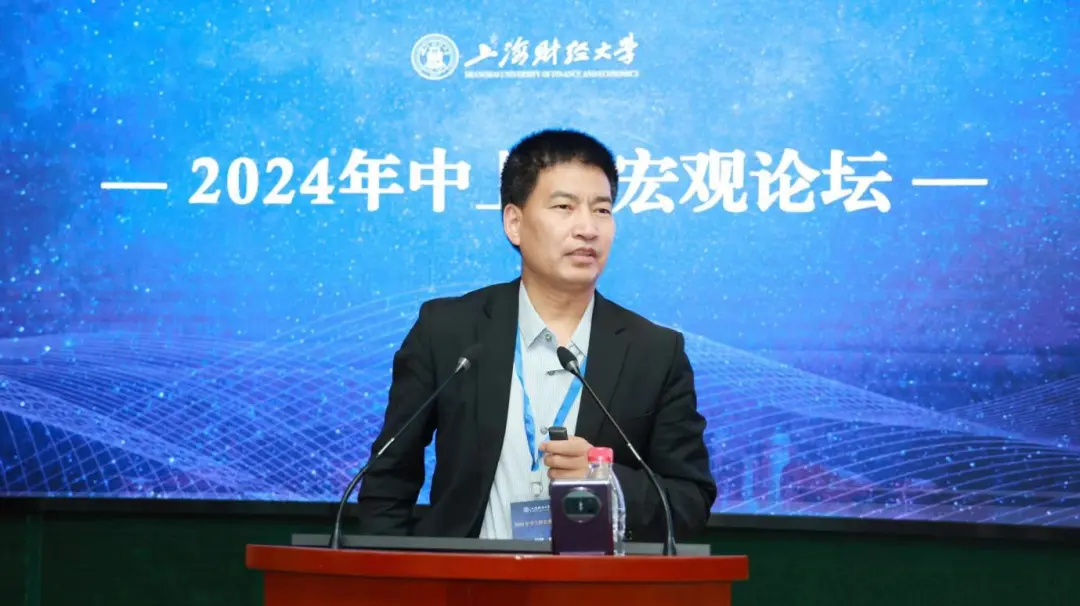
Zhou Jingtong delivered a keynote speech entitled "Review of the Formulation, Influence and Breakthrough of the U.S. Containment Policy on China". After reviewing the characteristics and content of the U.S. containment policy on China from 2018 to the present, he believes that China is in a critical period of becoming a "high-income economy" and that my country's economy is in a critical stage of environmental change, structural transformation and power switching. In the past six years, the U.S. containment policy on China has mainly included the imposition of tariffs, technological sanctions, financial containment and the reshaping of the global industrial chain and supply chain to de-Sinicize. Under these containment policies, China's economy, especially exports, has shown strong resilience. First, China's export share to the United States has declined, but its foreign trade competitiveness has not been significantly affected. my country's share of global exports has increased instead of decreased, the export market structure has become more diversified, and exports in emerging fields have grown strongly. Secondly, technological containment has forced China to improve its independent innovation capabilities, and restricted companies have paid more attention to research and development.
In addition, China is still the core node of the global supply chain and it is difficult to be replaced by other economies in the short term. He said that the containment policy has had a significant negative impact on the United States: the imposition of tariffs has directly pushed up domestic commodity prices in the United States, increased inflationary pressure through transmission and competition effects, and undoubtedly sacrificed the interests of a large number of American domestic companies and households; it has increased the instability of the global industrial chain and supply chain, undermined the world trade and investment order, and increased the exclusivity of economic and trade activities, which has seriously weakened the ability of the international community to jointly respond to challenges, and global geopolitical risks have risen. Regarding my country's future response and breakthrough, he proposed four suggestions: deepening reform and opening up, promoting industrial upgrading, supporting enterprises to go overseas, and improving cross-border financial services.
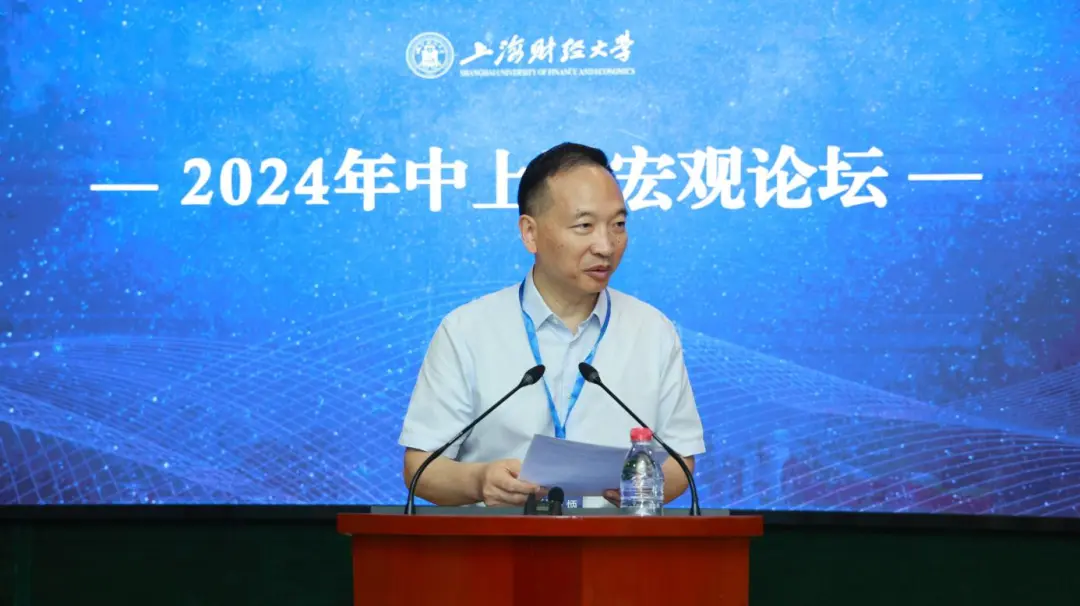
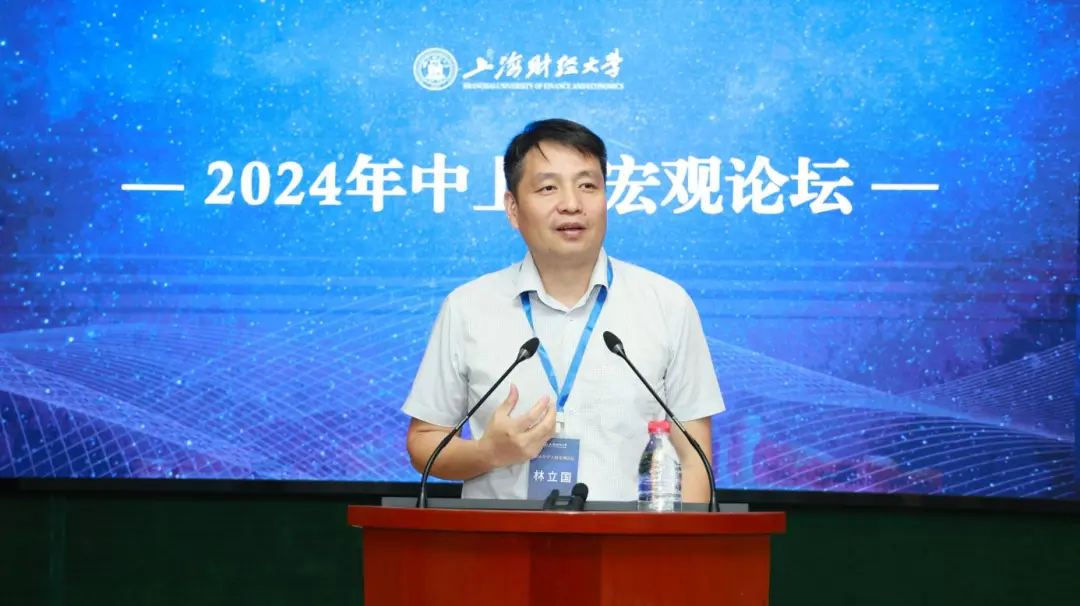
The forum was hosted by Shanghai University of Finance and Economics, and co-organized by the Institute of Chinese Modernization, School of Economics, Key Laboratory of Mathematical Economics, Ministry of Education, Dishui Lake Think Tank, and Dishui Lake Advanced School of Finance. The forum was co-hosted by Xu Longbing, Executive Dean of the Institute of Chinese Modernization, and Lin Liguo, Party Secretary of the School of Economics. Sina Finance and multiple video accounts broadcast the event live.


